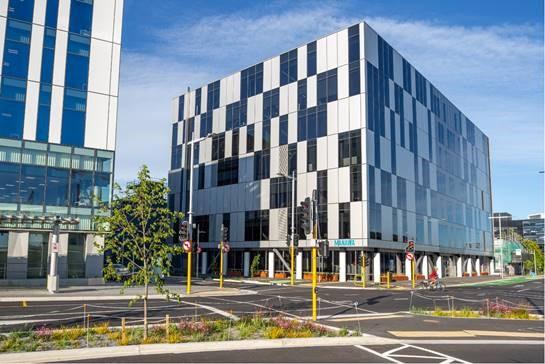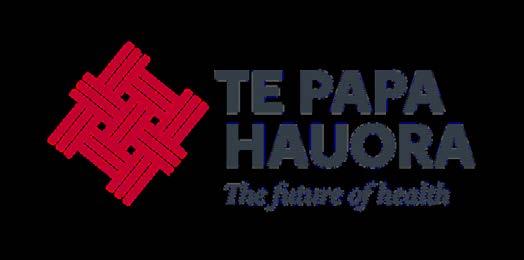Te Whatu Ora





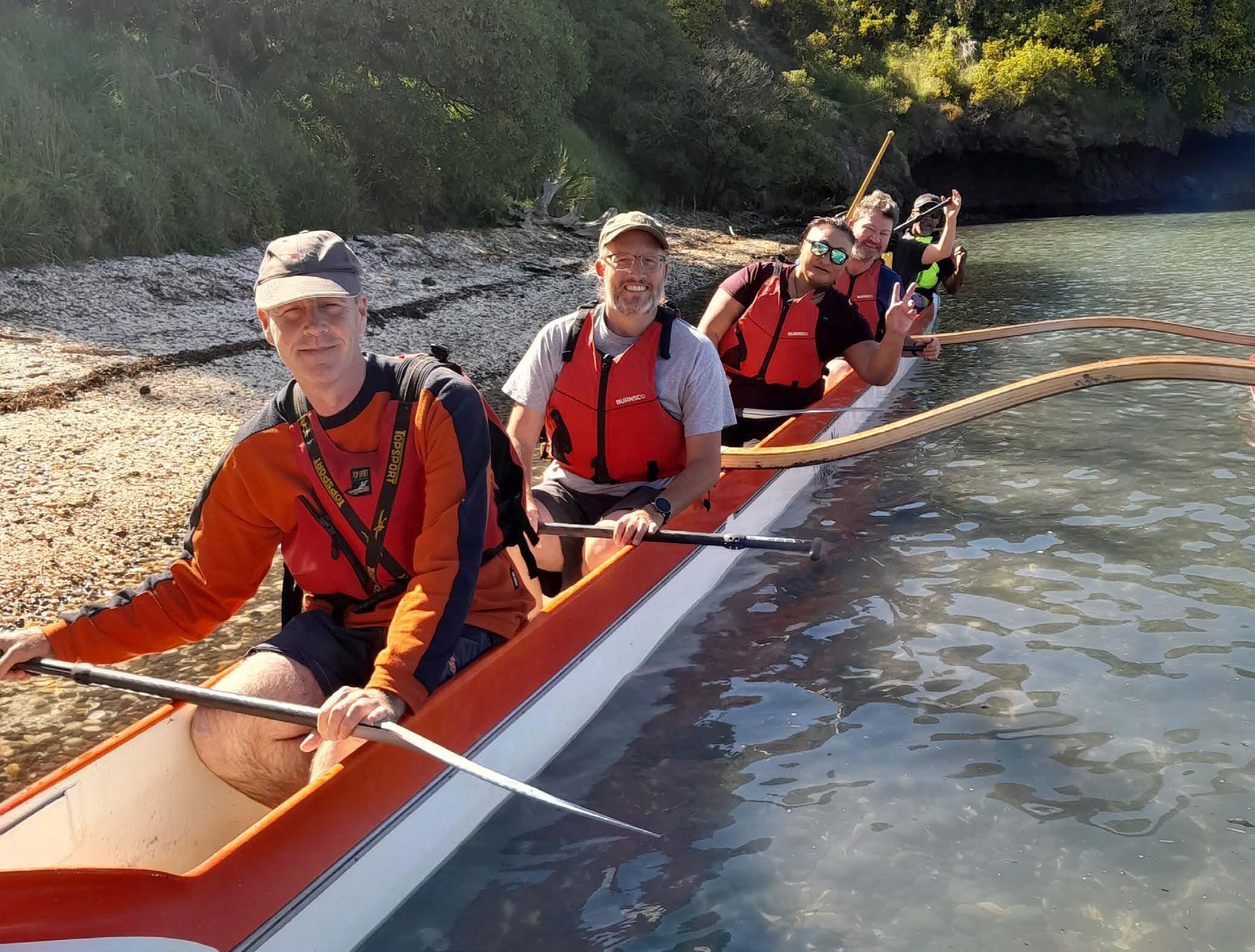
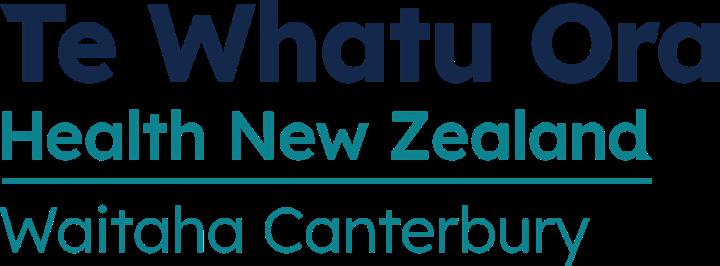
Kupu Arataki – Introduction... pg 3-6
Ā mātou tāngata – Our people


› Our winning waka... pg 7
› Te Reo Māori Akoranga #10 – Lesson #10 Ngā Wāhanga o te Tinana... pg 8
› Project SEARCH participant goes on to achieve her dreams... pg 9
› Thanks for the support... pg 10

› Inspiring sonographer... pg 10
› Meet my pet... pg 11–12
› One minute with… Lynda Benge – Autism Administrator... pg 13
Whakamihi – Bouquets ...pg 14–15
Ā mātou korero – Our stories
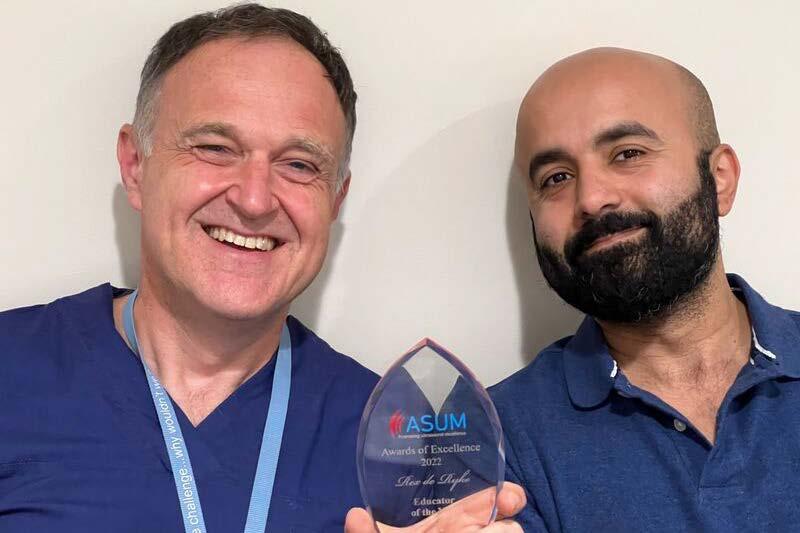
› Improved health outcomes through new Pae Ora Healthy Lifestyles ki Waitaha Service ... pg 16–17
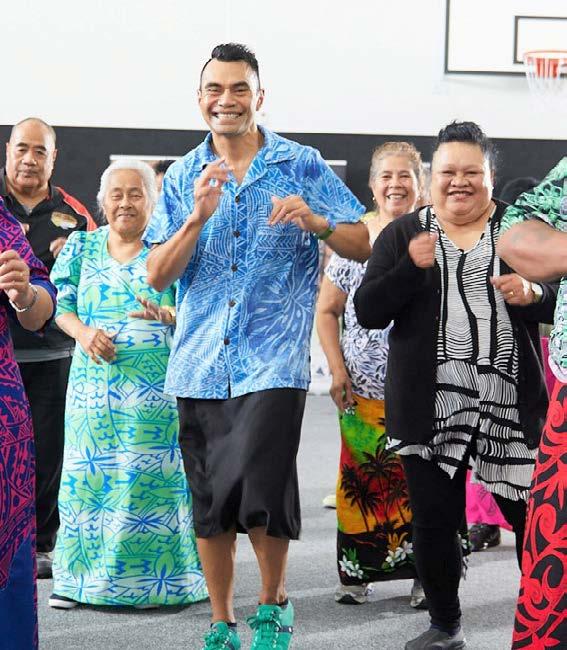
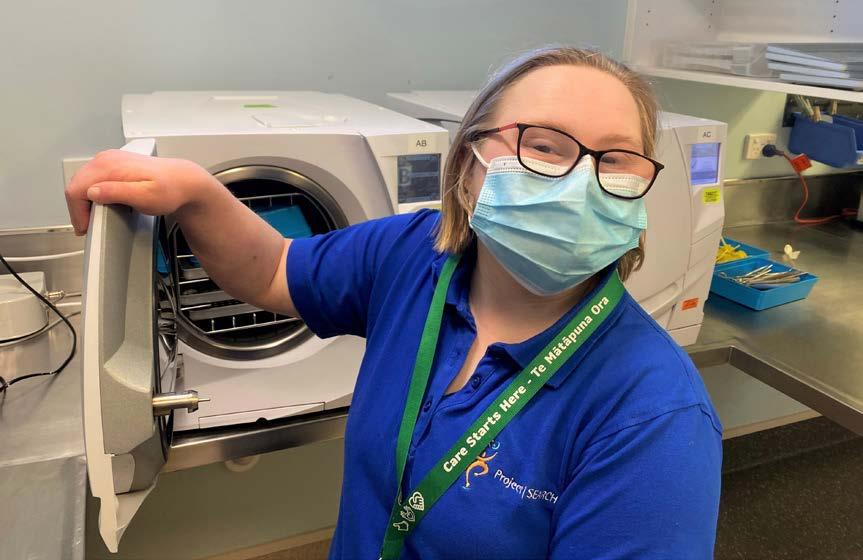
› Supporting young people with anxiety... pg 18
› Introducing a new champion for bowel screening in Waitaha Canterbury... pg 19
› Transgender Awareness Week ‘Counting Ourselves’... pg 20
› Te Rā Haumaru Tūroro o Aotearoa/ Aotearoa Patient Safety Day – Thursday 17 November 2022... pg 21
› Te Mana Ora supporting communication action on alcohol and Smokefree... pg 22
› World Antimicrobial Awareness Week 18 – 24 November 2022... pg 23–24
› Pānui – Notices ...pg 25–29

Thanks to those who worked over the long weekend, enabling colleagues to take a break – if you were able to enjoy an extended break I hope you made the most of the amazing weather. With just over a month until the Christmas holiday period, now’s the time to plan when you will take some leave, if you’re able to.
As an organisation that functions 24/7, we know that the holiday season can also be a busy time for urgent care, our Emergency Department, acute surgery teams and inpatient wards, so please talk with your team and manager and work out a leave plan.
After another busy year, it’s so important that those who are able to, take some time out to re-charge over the coming months.
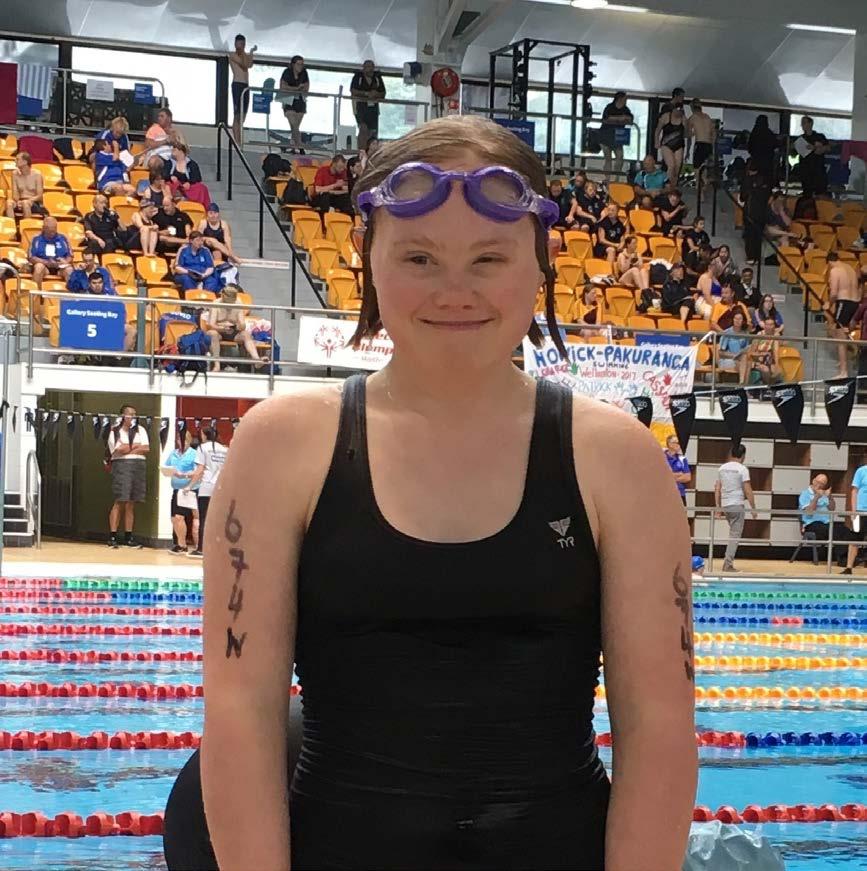
According to a recent study, New Zealanders’ participation in physical activity is declining, but it’s great to see many of our kaimahi (staff) are bucking that trend. This week we’re sharing some sporting achievements of staff.
A waka ama (outrigger canoe) team made up of Te Whatu Ora Waitaha Canterbury staff has been making waves, winning a recent competition in Rāpaki. See the story on page 7. We also have Bella Lammers, a former Project SEARCH Intern who has been named in the squad to represent New Zealand in swimming at the 2023 Special Olympics World Summer Games in Berlin. You can read more about Bella on page 9.
If you have any sporty success to share, we’d love to hear about it. Email communications@cdhb.health. nz
Last Wednesday was International Pathology Day and an opportunity to celebrate our ‘legends of the lab’. Pathologists, medical scientists, phlebotomists, in vitro diagnostics industry colleagues and couriers are known as the engine room of healthcare. What these people do informs diagnosis and treatment for countless patients every day.
From the beginning of the COVID-19 pandemic, through the Delta and Omicron outbreaks, the past two and a half years have tested us all and none more so than our pathology teams. Your work ensures better health outcomes for our communities and we greatly appreciate everything you have done and continue to do.
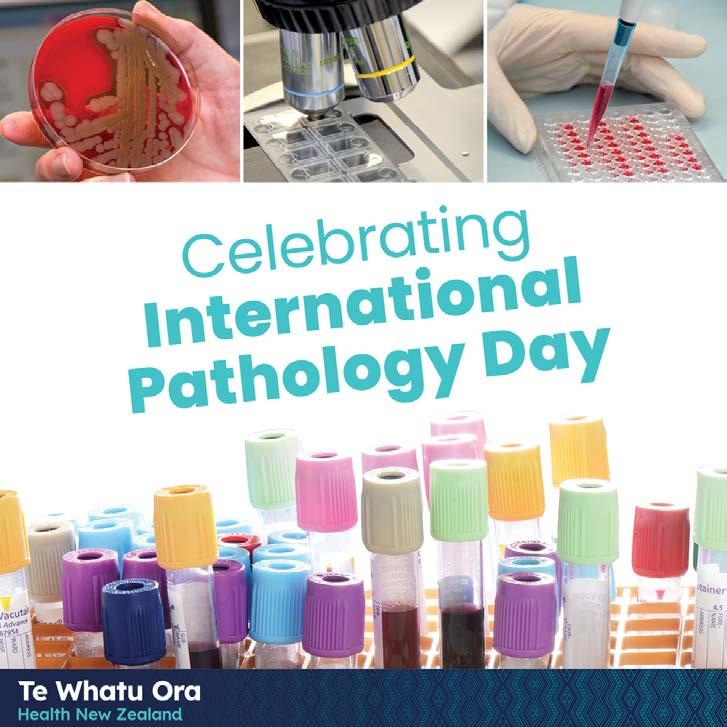
In line with Pae Ora, we’re taking the opportunity to look inward and check our own Mauri Oraindividual wellbeing, Whānau Ora – team/system wellbeing and Wai Ora – work environment.

We’re doing this by undertaking three short, sharp *Ngātahitanga Pulse Surveys with our kaimahi over the next six months.
We’ve decided to take a pulse approach rather than conduct a full engagement survey for a few reasons.
Pulse surveys provide real-time understanding of employee engagement allowing us to focus on questions as we go, and pivot quickly to best support our people, particularly as we make our way through transformation. The nature of our work and the time pressures on our people also mean any survey has to be quick and easy to complete.
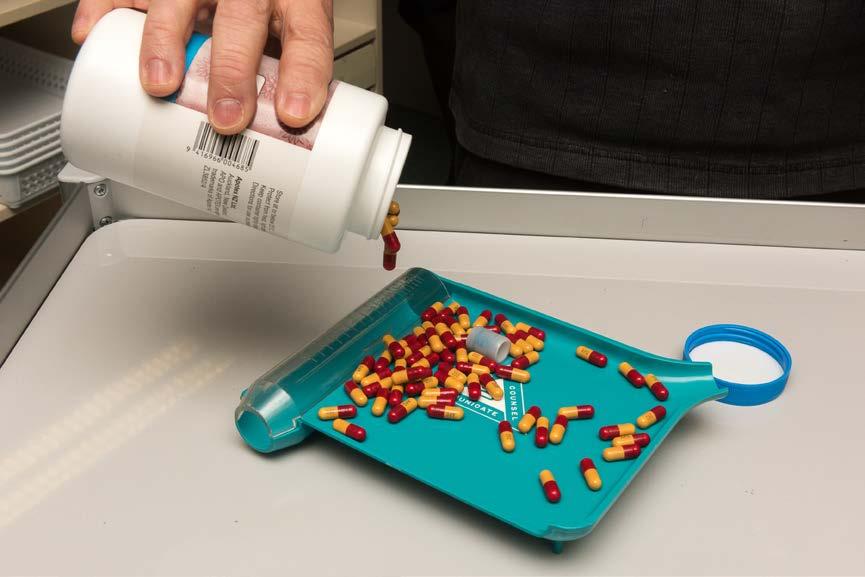
The Health Quality & Safety Commission is promoting Te Rā Haumaru Tūroro o Aotearoa | Aotearoa Patient Safety Day 2022 this Thursday, 17 November 2022. This year’s focus is on medicines at transitions of care from hospital to the community. You can read more about this on page 20
We’ll share more details of how you can take part over the coming weeks. Keep an eye on the Daily Global emails.
*The name of the survey, Ngātahitanga describes the values and principles which foster a ‘team of teams’ culture. The survey’s goal of listening to the voices of our people helps shape meaningful improvements for our kaimahi (staff), communities, patients and whānau, kia ngātahi te haere (unified journey).

Have a great week. Kia pai tō koutou rā
Peter Bramley
Interim Regional Director Te Wai Pounamu Interim District Director Waitaha Canterbury and Te Tai o Poutini West Coast
Last Tuesday was the inaugural World Ventil8 Day, initiated to raise awareness of the crucial role ventilation plays in enabling health and wellbeing. The 2022 World Ventilation Day theme was all about celebrating ventilation.
Ventilating and cleaning the air in buildings affects our health, comfort and wellbeing, but is often only really noticed when there is a problem. Good ventilation can reduce exposure to air pollutants and infectious diseases, help us to perform better and be more productive, enable us to sleep better, and reduce mould and damp in buildings.
Ventilation has been used to help prevent the spread of COVID-19 in schools, homes and businesses.
Ventilation technology also contributes to a sustainable and low carbon environment by balancing air quality and energy usage.
› People generally sleep better in a well-ventilated bedroom
› Studies have shown that higher ventilation rates in schools leads to better concentration, less illness and fewer absences
› Good ventilation in places where people live and work closely such as barracks, aged residential care facilities, hotels, hospitals and hostels, helps prevent the spread of respiratory illnesses
› Feel sleepy in the afternoons? Instead of reaching for the chocolate, open a window (if you can) or turn on a fan.
For more information on this day and how to better ventilate your space, check out the World Ventil8 Day website: www.worldventil8day.com/.
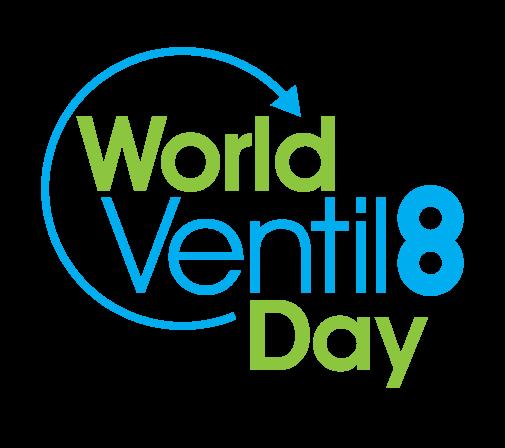

A proposal to shift reporting lines for core enabling services and some delivery services is now open to all kaimahi (staff) for consultation.
The consultation will run until 5pm Thursday, 24 November.
This proposal is intended to further enable changes to the way we work.
The enabling functions affected by the proposals are People & Culture, Data & Digital, Finance, Legal, Emergency Management, Communications & Engagement, and Sustainability. The district delivery functions affected by the proposals are Commissioning (planning & funding), Innovation and Improvement, and Pacific Health. Shared service agencies (SSAs) are also affected by the proposals.
Please visit our new Consultation Hub
From here, you’ll be able to register to take part in the consultation using our online tool What Say You.
You will be able to:
› read what’s proposed in the discussion document
› ask questions
› say what you think about the proposal
› read and comment on what others think about the proposal.
You do not have to read or comment on the proposed changes, this is optional.
The review of the feedback and final decision is expected to be completed by mid-December, with changes being rolled out from January 2023.
Are you a football fan or a fanatic? Test your knowledge of the English Premier League.
1. What year was the Premier League founded?
a. 1990 b. 1991 c. 1992 d. 1993
2. Which team won the inaugural Premier League season?
a. Manchester United b. Liverpool c. Aston Villa d. Blackburn Rovers
3. What was significant about the 2003/04 Arsenal season?
a. The team lost every game they played during the season b. The team won every game they played during the season c. The team drew every game they played during the season d. The team scored no more than two points in any game that season
4. Which team has never won a title during the Premier League era?
a. Blackburn Rovers b. Chelsea c. Liverpool d. Southampton
5. True or false. Harry Kane holds the all-time Premier League goal scoring record. a. True b. False
6. At which club did Wayne Rooney make his Premier League debut?
a. Manchester City b. Manchester United c. Everton d. Liverpool
7. What is the team from Newcastle United also known as? a. The blackbirds b. The magpies c. The crows d. The canaries
8. Which team won its first ever title in the 2016 Premier League competition?
a. Leeds United b. Tottenham Hotspur c. Chelsea d. Leicester City
9. How many Premier League titles did Sir Alex Ferguson win as manager, before he retired in 2013?
a. 10 b. 13 c. 15 d. 16

10. What did Eric Cantona do in 1995 that earned him a nine-month ban from the Football Association?
a. He leapt into the crowd and kicked an opposition fan b. He removed his clothes on the side-line c. He assaulted a referee d. He punched his team manager during a game
Check your answers on page 25
Many won’t be aware that Te Whatu Ora Waitaha Canterbury has a waka ama (outrigger canoe) team. Based on traditional Polynesian outrigger canoes, the waka ama are usually raced as singles, a team of six or a double-hulled team of 12.
At a recent event in Rāpaki called the Pioke Pursuit, hosted by Te Waka Pounamu and Ngāti Wheke, the team raced four times during the day. Reaching the final, they managed to beat Te Waka o Te Matauranga, from the Ministry of Education by just four seconds.

In preparation for the Pioke Pursuit, the team trained at Kerrs Reach on the Avon River every Friday afternoon for about a month.
Trades Assistant in Christchurch Hospital’s Maintenance and Engineering department and waka ama team member Wayne Perrett says the day of competition was thoroughly enjoyed by all.
“The pleasing thing for me was the spirit in which the teams raced. This was a mixed gender event with club members, many not racing in their normal teams. There were world champions who won gold in the UK recently, paddling alongside novices.”
The Te Whatu Ora Waitaha Canterbury waka ama team on the water during the Pioke Pursuit in Rāpaki
The team’s sights are now set on the Whakaraupo Ocean Challenge in March 2023, a 10km event with paddling and challenges around Lyttelton Harbour. Wayne says there is interest in creating a Te Whatu Ora event in the future too.
The Te Whatu Ora Waitaha Canterbury waka ama team members include:
› Maintenance and Engineering (M & E) Trades Assistant Wayne Perrett
› M & E Maintenance Operations Manager Peter Van Meer
› M & E Maintenance Manager Weeks Heist
› Environmental Services Cleaner Tina Maui
› M & E Building Services Technician Dave Pote
› M & E Painter Rochelle Tourell
› M & E Maintenance Manager Damon White
› Contact Trade Assistant Sophie Rae
› M & E Facilities and Engineering Manager Terry Walker
› Training Intern, General Medicine Caitlin Ruddle

› Māori Hauora Administrator Nicky Ward
Anyone keen to join the team or learn more can email wayne.perrett@cdhb.health.nz
Kei ngā waewae kai pakiaka, tēnā koutou.
Greetings to you who are accustomed to dealing with difficult tasks and challenging times.
This week we are going to look at some parts of the body which can be very useful for all of us to know in the healthcare setting. Click on the link for further details
Waiata or songs are a very useful resource when learning te reo Māori, especially those waiata that are designed for tamariki (children). The following link takes you to a song which may be familiar to some of you as a childhood classic “Heads, shoulders, knees and toes”, but this is a Māori version.
Have a listen and challenge yourself to remember each of the body parts in the waiata

www.youtube.com/watch?v=wZLje3MmrPE
Perhaps even learn it alongside your children, your nieces or nephews, or your grandchildren.
He aumihi tēnei i ā koutou whai wāhi mai. In acknowledgement of your participation.
If you have any questions or feedback, please make contact via the email below. Hauora. Maori@cdhb.health.nz
Former Project SEARCH Intern Bella Lammers, has been named in the New Zealand swim squad to compete in the 2023 Special Olympics World Summer Games in Berlin in 2023.
Project SEARCH is an employer-led programme providing a year-long internship to students with learning disabilities, so they can develop new skills in the workplace, supported by a transitional school environment. Te Whatu Ora Waitaha Canterbury (Canterbury DHB as it was then) was the first in Australasia to offer this programme.
Bella, aged 21, is part of a 40-strong swim team that will compete in the games being held in June next year.
“I love swimming and I train four to five times a week at the Selwyn pool at the moment, sometimes with an instructor. I’m really proud and excited about travelling to Germany. I’m also a bit nervous travelling without my family,” she says.

Bella is also preparing for the National Special Olympics in Hamilton in December. She won three medals at the last games in Wellington.
As part of her internship, Bella was placed at Burwood Hospital and the Aranui Community Dental Clinic.
“I loved working at Project SEARCH. At the dental clinic I learned to use the machine to sterilise the instruments and they told me I was really good at that job. I loved making lots of new friends at Project SEARCH,” Bella says.
Bella using the autoclave machine to sterilise dental equipment during her stint at Project SEARCH at the Aranui Community Dental Clinic

Community Dental Services Team Leader Kim Heslop says the support and encouragement Bella received while working with the team at Aranui may have played a small part in contributing to building her confidence to achieve her dreams. “What a wonderful achievement.”
Project SEARCH Coordinator Linda Leishman says a talented bunch of young people come through Project SEARCH.
“One of our 2022 interns is currently travelling back from the World Down Syndrome Champs in Portugal, via Brisbane where he is competing in the Virtus Oceania/Asia Games.”
Bella is also training for her green belt in karate and has just moved into a flat with two flatmates.
A big thank you to Enrolled Nurse and Bachelor of Nursing student Avi Gosai who answered the call at short notice to help out at Christchurch Hospital during a challenging period.
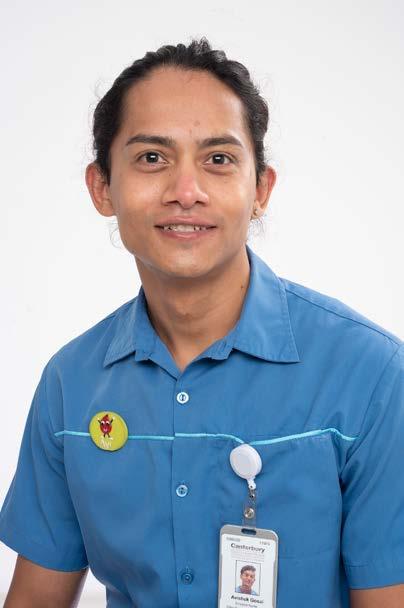
Avi usually does a few shifts a week at Burwood Hospital but stepped up twice to work as a resource nurse to alleviate pressure on the Emergency Department and Parkside Ground Medical at Christchurch Hospital recently.
“I am just pleased I could be of help and I would like to thank my manager, Charge Nurse Manager Operations at Burwood, Tracey Holtslag, for providing me with these opportunities. It was great exposure and a highly valuable experience for my own practise,” Avi says.
“I must also credit the duty nurse managers at Christchurch Hospital. They were so supportive and communicated very effectively with me, which made my work easier and the whole process smooth.”
Avi is trained in venepuncture (the process of obtaining intravenous access) and cannulation (when a small plastic tube is inserted into a
peripheral vein) and was able to use these skills when intravenous technicians were busy.
“I really enjoyed the whole experience and am so grateful for it. I learnt a lot from my Christchurch Hospital colleagues and it’s opened up areas of interest for me for when I qualify.”

Older Persons Health and Rehabilitation/Te Waipounamu/Waitaha Canterbury Kate Lopez says Avi’s clinical skills would have been appreciated given how busy our system is currently.
“Thanks for being so flexible and willing to support our colleagues, it’s really appreciated.”
Director of Nursing (Acting) Nathan Hood says he has received very positive feedback about Avi from colleagues at Christchurch Hospital.
Charge Sonographer Rex de Ryke was awarded 2022 Tutor of the Year in the recent Australasian Society for Ultrasound in Medicine (ASUM) Awards of Excellence.
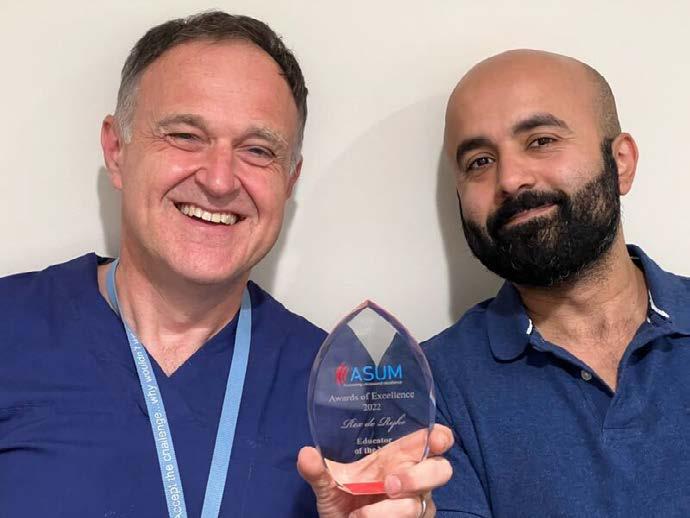
He had multiple nominations from his colleagues in the Emergency Department at Christchurch Hospital.
A post by the Australasian Society for Ultrasound in Medicine says Rex has a reputation for striving to add value to his patients and colleagues by supporting ultrasound education.
“He enjoys the life-long learning gained by teamwork and collaboration. Congratulations Rex!”
The ASUM award categories are a mix of nomination, election and outright performance and are designed to cover almost everything ultrasound.
Some of the industry’s most reputable experts, as well as the quiet achievers, are recognised in these awards.
Rex says it’s an honour to receive such an award, and a privilege to work with such dedicated and motivated emergency medicine doctors, and other hospital physicians in what remains a challenging environment.

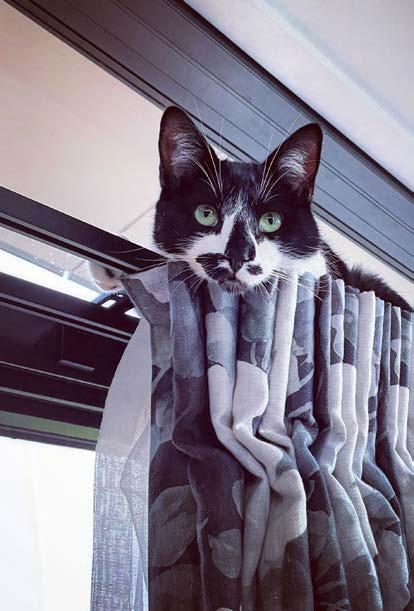
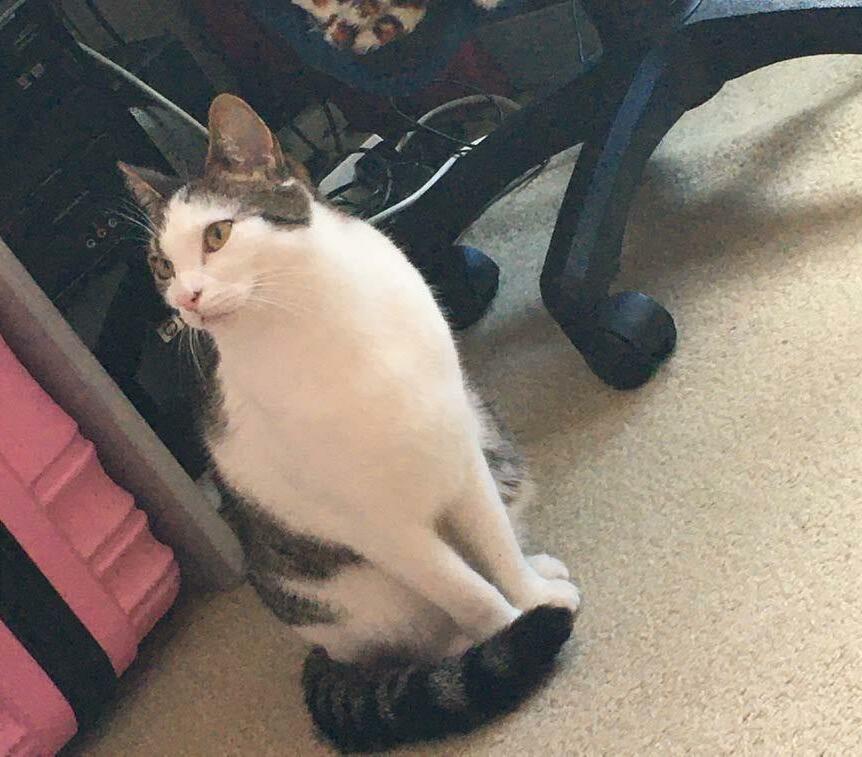

Half Tabby, 2 years old Demi likes pats and cuddles. She likes playing with paper bags, she will go inside them and attack the bag until it's tattered and ripped apart. She has a strong head, she can push open the door by herself. If she accidentally hits her legs while running, she will keep running. She is bulletproof!
Melissa Ng, IT Helpdesk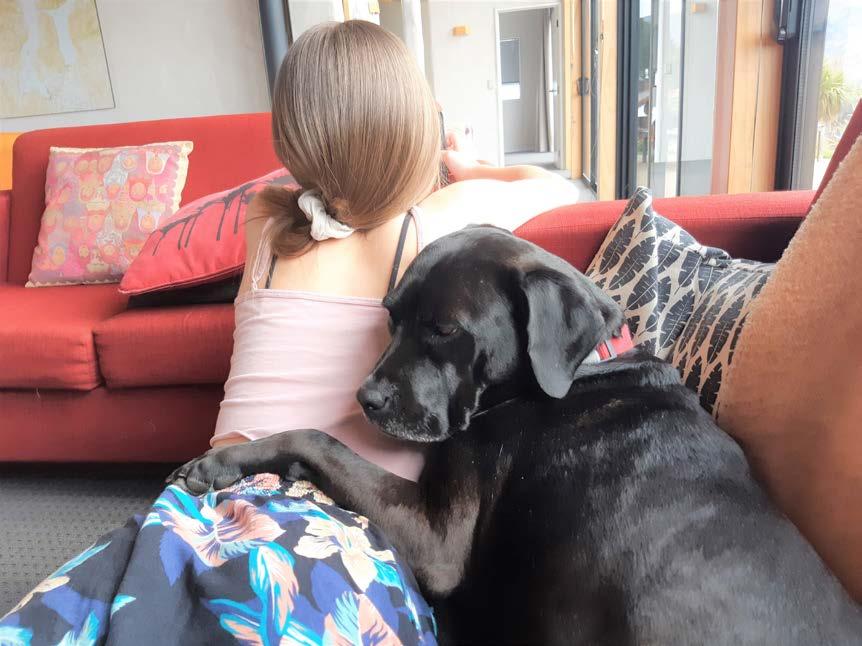
Our dog is a rescue and was two years old when we got her. She's now a registered therapy dog and accompanies my GP partner to her practice at Lincoln Uni, where all the Agriculture students come in just to get their dog fix. She sits in the counsellor’s office and some patients just spend their whole time communing with her, rather than talking to the counsellor. Apparently, that works quite well.
Dave Nicholl, Service ManagerBirman cross, 2 years old Cous Cous (pictured with the board game) and Tuki Tuki (photographed on the curtain rail) are Birmans crossed with a naughty black feral farm cat. They are sisters who are always up to mischief, be it hiding on the curtain rail, stealing toys and games or terrorising mice. I blame the father! They replaced our old cats Sacha (22 years old) and Lucky (21.5 years old) and we dream of getting them to similar ages
Jo Gullam, Consultant ObstetricianManx, 4 years old
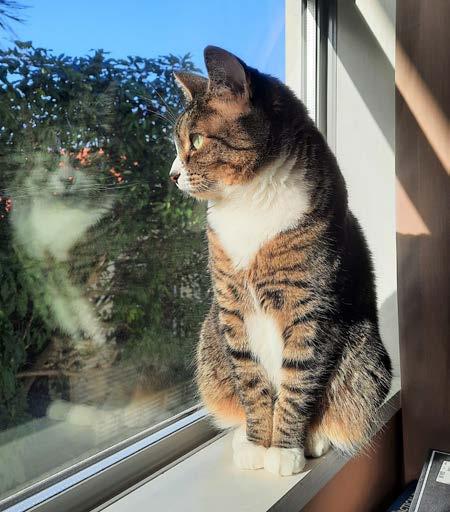
Parsnip is an SPCA rescue. I adopted her in December 2019 and she was great company during the lockdowns. She's super nosy and chatty, I always have to apologise for her joining in on Teams calls when I work from home!
Alice Ronald, Business AnalystFrench Bulldogs, Marula (left) is 3½ years old and Maze is 2 years old


Like true French Bulldogs, these two love to do zoomies and sleep a lot. They love a good cuddle on the couch and walks in Hagley Park. Maze is a little jealous of her big brother but makes up for it with endless licks to his face. Marula is a little special and has some challenges with the dayto-day life of a dog, but his happy pills help him to face his anxiety like a little champ.
Chenay Roux, Learning DesignerDue to overwhelming interest, we can't accept any more 'meet my pet' submissions. All pet introductions already received will feature in upcoming pānui.
Providing administrative support for the autism coordinators who work with young people who have had a recent diagnosis of autism. I send referrals to support services, type the support plans, book and waitlist home visits and group appointments, attend triage and other administrative duties.
If learning about autism and working for neurodivergent children interests you, then that’s a good start. Even though you wouldn’t be working directly with the children, you are making a huge difference to their lives by doing all the, ‘behind the scenes’ work which helps immensely. This is a role where you can make it your own, work independently, create your own routine and be responsible for your own work. Don’t be afraid to express new ideas and different ways of doing things because this role offers some degree of flexibility. This position didn't exist before my arrival in April 2022, so you could say this role is developing. Learn about the support services in the community that are for neurodivergent young people and familiarise yourself with the disabilities that can come with having autism. Ask questions and take the odd opportunity when asked to attend autism group sessions with the Autism Coordinators. This helps you understand the importance of the role that you are doing and what everything means.
The Child Development Service Team. They are a very hardworking and dedicated team who deal with a diverse range of people with children who need a lot of support and guidance which can be challenging. I think they’re very brave and understanding people!
What do Waitaha Canterbury’s values (Care and respect for others, Integrity in all we do and Responsibility for outcomes) mean to you in your role?
Taking on the responsibility of getting each young person with a recent diagnosis of autism referred to our service and getting as much support that
is available to them. Ensuring all are treated fairly and respectfully and that no one is missed. Also, taking some of the workload and stress off my team (specifically the Autism Coordinators) so they can have more time liaising with our awesome young people and their whānau.

If you could be anywhere in the world right now where would you be?
Honolulu, Hawaii. I like to relax and chill out, especially after having such a busy year.
Who would you want to play you if there was a movie made about your life?
I had to take an online quiz for this because I had no idea! And the quiz result was, Mila Kunis.

What are your hobbies/interests outside of your work?
Travel, outdoor activities, yoga, music festivals and fitness classes.


A few weeks ago, I spent an unexpected five nights on the maternity ward after my labour didn’t go quite as planned. I had sepsis and my baby was born with pneumonia and sepsis. I cannot rate the staff highly enough, from NICU, the labour ward through to the maternity ward, the staff were excellent. It was obviously a very busy time and staff were under the pump, however, they always promptly answered call bells and I never felt rushed while they all continued to offer guidance and support while navigating the difficulties of breastfeeding. Two ward staff stand out in particular, Jessa and Anju. As a nurse myself I was very impressed with the care I received. Thank you.
I have had two acute presentations to ED in the past seven weeks. The service I received was exemplary – swift, focused, professional, clear and concise communications, and room and empathy for myself and loved ones. It really could not have been better. I felt like a star in a movie on how emergency care should be given. The presentation of your care and service pushed through challenges with remarkable and laudatory aplomb. Thank you.
Gaye, one of the volunteers was so helpful and kind. She went above and beyond to assist in the transfer of a patient to ED. She always has a smile on her face, is calm under pressure and a joy to see in the corridor.
Please accept my heartfelt thanks to the nursing and medical staff who gave my 95 year-old mother such wonderful care when she was admitted to Christchurch Hospital. As the daughter of a 95 year old woman with COVID-19, the prospects were daunting, however, both Mum and I felt very safe and in very professional hands. Thankfully Mum only required a short stay, but I wish to acknowledge the very high standards of care she received. I know everyone involved in healthcare currently are under a lot of pressure, but from the care we received you would never know that. Once again, thank you and your work does not go unnoticed.
My father was admitted to hospital via ambulance. The ED was incredibly busy. Despite this, my father received great care by the nurses and doctor. There were no beds available, but he was managed well by staff in a difficult situation. My father was transferred to the Parkside Ground Medical (PGM) ward. Nurse Olivia McGregor in PGM is a fantastic nurse. Great communication and support to our family.
Very good and gave a very quick response regarding my ear surgery and treatment. Thank you!
Your nurses are outstanding people. We have been in here for four nights and they have all been absolutely amazing on so many levels. Thank you for all you do.
What a lovely service these nurses are doing in this hospital. Wonderful way of treating our mum. The tea and coffee service in between meals is an absolute convenience and stunning way to welcome their patients and the families. This is what we miss in American hospitals. The doctors that we met and their teams, both here and Burwood Hospital, are wonderful. The way they explained their duties and the services offered to treat my mum was outstanding.
I was recently admitted for acute appendicitis and wanted to take the opportunity to heap praise on all the staff involved. From the arrival in ED the support and kindness shown was commendable. All the staff – Reception, nursing, cleaners, orderlies, doctors and WellFood (and any others I’ve overlooked) were superb. I felt fully informed and safe along every step of the way. The facility is world class and assists in making you feel comfortable and very well looked after. And when I felt able to eat, I was impressed by the kai and the WellFood staff. It was very good.
I would like to thank Annie and Jan who looked after and comforted me when I experienced discomfort with my cast. Jan and Annie replaced it with a very neat and comfortable new cast. I am impressed by the speed at which my cast went on and it is top quality. I would also like to mention the kind nurse in ED who took my details. I was in tears from sleep deprivation and stress and she allowed me to take my time and was sympathetic.
Thank you for this opportunity to say a big thank you to the ED, for they were ‘tops’. I give them 10 out of 10 for their patience, kindness and professionalism. The people who attended to me were just marvellous. Thank you from me in my time of need.
Due to circumstances beyond my control, I was going to be 30 minutes late for an X-ray. I rang through to explain the situation. The staff were wonderful and slotted me in slightly later the same day. Thank you for being flexible, helpful and wonderful to deal with. A five-star team!
The staff and medical people at Burwood Hospital treated me with warmth and respect. I was helped to feel well informed and attended to. Given the level of work and current situation in the hospital, care is still clearly given priority, despite the pressures. Thank you.
In October, I had a meltdown in Ward 14. I was sobbing my eyes out, I’m not normally a ‘drama queen’, but I fled to the lounge to be alone. An absolute angel named Jake asked why I was so upset. He brought me blankets, a pillow, a cup of tea and held my hand. He kept checking on me right through the night. The staff at Christchurch Hospital are second to none, but Jake was exceptional. The only thing missing for him was wings. Please commend him.

You’re all wonderful! Thanks for looking after my brother so well.
Thank you all so much for the wonderful care everyone (staff, nurses, doctors, orderlies, cleaners and WellFood staff) gave to my father. Being on holiday and having to race him to ED was not the best. You guys have made it easy to deal with. From one RN (Registered Nurse) daughter, I thank you from the bottom of my heart. Keep up the great work with those beautiful smiles and humour.
My two-year old grandchild has recently had admissions to Children’s Emergency, Children’s High Care, Intensive Care Unit (ICU) and then follow-up in Paediatric Outpatients by Paediatric Registrar, Sam Dalton. I wish to thank everyone, doctors, nurses, physiotherapists that cared for her and provided medical care and support. They ensured that mother and child were reassured and kept informed as to procedures and progress along the journey, despite heavy workloads they all carried. A special thanks to Sam for his empathetic care and excellent communication with mother and child.

Back in July, New Zealand Doctor ran one of Te Whatu Ora Waitaha’s media releases to inform its readers of the rationale for the development of the Pae Ora/Healthy Lifestyles Waitaha service, which incorporates ideas and feedback directly from consumers.
Pae Ora Healthy Lifestyles ki Waitaha takes a proactive approach to support our community to achieve improved health and wellbeing and reduce the burden of disease on those with long term health conditions.
Acting Executive Director for Planning, Funding and Decision Support Melissa Macfarlane, says the service has been developed following a thorough co-design process with the community and the new programme will reflect the findings of that positive engagement.
“With the shift to Te Whatu Ora – Health New Zealand, this was an exciting opportunity to work differently with our providers and their feedback has been instrumental in guiding our approach.”
Pae Ora ki Waitaha, a working group of the Population and Health Service Level Alliance, held extensive community consultation with our Māori, Pacific, youth, disability, rainbow, older persons and refugee communities, as well as with clinicians across the health system. This was done to understand how to promote greater equity and meet needs more closely.
Te Whatu Ora Waitaha Canterbury drafted a new service model with the providers, which will enhance our ability to provide culturally engaging, responsive, accessible and whānau-centred services.

As a result of that process, the new Pae Ora Healthy Lifestyles ki Waitaha service will be provided by Waitaha Primary Health, Tangata Atumotu Trust, Whānau Whanake and Purapura Whetu Trust.

Waitaha Primary Health Chief Executive, Bill Eschenbach says he is delighted to be part of the new Pae Ora Healthy Lifestyles ki Waitaha service.
“A Pae Ora Healthy Lifestyles Connector will be assigned to a client and will work alongside them and their whānau to set their own goals, which will help them achieve their aspiration of living a healthy lifestyle.
“Our Whānau Ora approach will support our clients to remove barriers for achieving that healthy lifestyle and sustainable intergenerational change.”

Karaitiana Tickell, Kaiwhakahaere of the Purapura Whetu Trust, explains that the service aims to unleash the full potential of the whānau who access it.
“We are excited to work together to provide the best support and encouragement we can through identifying the needs of our clients, what is unique to them, and ensuring supports are culturallyinformed and relevant for the life they lead.”

Harvesting wātakirihi (watercress), rich in vitamins. Mahinga kai (gathering from natural resources) together promotes connection with our taiao (natural world) and acknowledges practices shared from our tupuna (ancestors)
Since then, work with the new providers is underway to finalise processes. Further information on how to make referrals to the new service is now available to primary care through Canterbury HealthPathways
“We are all eagerly looking forward to launching the new service in mid-November 2022,” Melissa says.
Anxiety is one of the toughest and most common challenges that Aotearoa’s young people and families face.

Understanding how it works and what we can do about it can make a big difference.
For over a decade, the four session, face-toface PACES group (Parenting Anxious Children –Education Sessions) created by Child and Family Clinical Psychologists Carolyn Doughty and Cherie Benns, has run every term and helped Canterbury parents learn strategies for supporting children with anxiety.
With COVID-19 disrupting the face-to-face groups in 2021 and 2022, Child Health Psychologist Nicola McDonald has now adapted the content to be viewed by anyone online: www.cdhb.health.nz/yourhealth/supporting-young-people-with-anxietystrategies-for-parents/
The series of four online videos pull together useful, practical information about managing anxiety for parents and cover:
› Anxiety: where it comes from, how it works, how it feels, and how it impacts young people

› Feelings/experiences of parents supporting anxious children
› Anxiety cycles and how to change them
› Avoidance and exposure
› A wide variety of strategies for managing anxiety
› How to support young people to do things that frighten them
› How to look after yourself
› Other resources you can tap into.
A slide from the video
The videos are free for anyone to access and can be viewed as many times as people wish. No referral is needed.
Initial consumer feedback suggests parents are finding the videos very helpful. Further feedback will be collated and used to create additional content as needed, Nicola says.
“It is hoped that face-to-face groups will be offered again for parents referred by paediatricians and Child, Adolescent and Family Services case managers in 2023.”
Referred parents will be able to choose whether to attend groups or view online content (which will remain free to access without referral), she says.
Te Whatu Ora Waitaha is delighted to welcome Ann Bergman as Māori champion for this lifesaving kaupapa.
Following the sad passing of Dame Aroha ReritiCrofts earlier this year - to honour her and ensure her ka pai te mahi continues, Ann takes up the baton for whānau everywhere and on behalf of Te Ropu Wahine Māori Toko i te Ora (the Māori Women’s Welfare League).


“It’s about leadership,” she says. “If somebody hears our message and feels in a better place to take part in the programme, then that’s the job done.”
Through the National Bowel Screening Programme, people aged 60 to 74 receive a free test kit on or near their birthday every second year. In Waitaha, more than 4000 of those eligible are Māori.
Clinical Lead for the programme in Waitaha, Dr Teresa Chalmers-Watson explains how doing this little test saves lives:
“The test picks up tiny traces of blood in your tūtae, which is an early sign that something might be wrong.”
“When we catch cancers early enough, we are much more likely to be able to treat them successfully – and we can also remove small growths to stop you getting cancer,” Teresa says. Ann falls into the eligible age band and has completed and returned her test.
“I felt, ‘I can do this’, put it in the post and thought nothing of it. Two weeks later I got a call from my GP to tell me my result was positive.”
“Did I have a wee panic session? Heck, yes I did! But I re-read the information and it really calmed me down.”
Ann had a procedure called a colonoscopy that finds cancers and pre-cancers and often enables them to be removed then and there.

“If I hadn’t used and returned my test, I might not have noticed any symptoms until it was too late,” Ann says.
“There are plans to reduce the eligible age for Māori and Pacific People to 50 next year –enabling them to get tested sooner. Isn’t that a brilliant outcome?”
“Māori die too young and if there is something you can do to stop that happening, then you should do it.”
“My message to you whānau, is to do the test and return it straight away. If you are too young, encourage your aunties and uncles to take part – it could save their life.”
Here in Aotearoa and around the world, 13 – 19 November marks Transgender Awareness Week.
This is a week when transgender people and their allies bring attention to the community through educating the public about who transgender people are, sharing stories and experiences, and advancing advocacy around the issues of prejudice, discrimination, and violence.

Unfortunately, both globally and here in Aotearoa, our transgender community are likely to experience some of the worst health outcomes due to mental health issues, substance abuse and addiction, homelessness or unstable housing, and high rates of unemployment and discrimination.
In 2018, the very first New Zealand ‘Counting Ourselves’ online survey on the health and wellbeing of trans and non-binary people living in Aotearoa was undertaken. Some of the key findings were that over a third (36 percent) of participants had avoided seeing a doctor because they were worried about disrespect or mistreatment as a trans or non-binary person.
Five out of every seven participants aged 15 years and older (71 percent) reported high or very high psychological distress, compared with only eight percent of the general population in Aotearoa New Zealand and the self-harm and suicide rates were extremely high. This survey is an essential piece of research giving us a starting point in the journey to help improve the health equity of our trans and non-binary communities.
This year, the second wave of the ‘Counting Ourselves’ online survey was released and is now live until 30 November. The anonymous survey is for all trans and non-binary people aged 14 and over, and includes questions around emotional and physical wellbeing, accessing general and gender affirming healthcare, cultural wellbeing, social support and connectedness, among others.
It is fitting that the survey coincides with Transgender Awareness Week to help promote equity, diversity and inclusion because when minority communities are able to see themselves, to feel visible, they feel not only valued but

empowered as embraced members of our whānau and global community.
It is hoped that the results of this second survey will show that the inequity gaps for our trans and non-binary communities will have decreased but will also point us to areas that still need improving. Here at Te Whatu Ora Waitaha we can also help improve these outcomes for the trans and nonbinary community by honouring our values of ‘care and respect for others’, integrity in all we do’ and ‘responsibility for outcomes’.
We also have the opportunity to be allies by providing safe spaces, being positively curious and seeking out resources and information. For more education, Te Whatu Ora Waitaha now has a suite of Rainbow Diversity Workshops being presented weekly. These can be delivered personally to teams and departments by a facilitator of lived experience from the rainbow community, you can register on HealthLearn here or by emailing ManaTaurite@ cdhb.health.nz
The Health Quality & Safety Commission (HQSC) Aotearoa Patient Safety Day is being celebrated, with patient safety initiatives across the Waitaha Canterbury service, during 14 – 18 November.
‘Medicines at transitions of care on discharge’ is the focus, aligning with the (WHO) World Health Organization’s theme of ‘medication without harm’.
During the week of 14 to 20 November, Waitaha Canterbury pharmacists along with other health care staff are focusing on the ‘three Ps’ as part of care for discharge.
Te Whatu Ora Waitaha Canterbury Chief Medical Officer, Richard French says, “This year’s focus for Patient Safety Day being on the 3 Ps is an opportunity to reflect on what we do well and take opportunities to improve our patients’ understanding of medicines”.
The three Ps, essential as part of care for discharge are:
› Provide a complete list of medicines, including indications for the medicines, and any changes made
› Patient and whānau understand their medicines, side effects and any changes

› Practicalities of accessing the medicines considered before discharge.
The first, (provide) is about ensuring patients understand and are alerted to any changes to their medicines following a hospital admission and that they always receive a list of their medicines and clear communication about any indications before leaving.
This reduces the risk of patients receiving incorrect medicines, doses or durations, and helps health care workers make appropriate decisions without duplicating or omitting treatments.
The second (patient) supports the Aotearoa New Zealand Code of Health and Disability Services Consumers' Rights requirement that patients and whānau understand their medicines, the risks and what to look out for (side effects), as well as any changes.
Establishing how a patient will be able to access medicines before discharge from hospital falls under the final P (practicalities), a broad area that encompasses several hands-on considerations. These range from whether the patient needs a blister pack or a different dispensing aid to whether the pharmacy needs to make a suspension or a special cream and understanding whether a patient (or their relevant caregiver) can effectively self-administer their medicine or has difficulty swallowing pills or giving injections.
Additionally, if patients, whānau or caregivers can access a pharmacy to fill script on discharge (e.g. considering time of day).
Further information about Te Rā Haumaru Tūroro o Aotearoa | Aotearoa Patient Safety Day, including the ‘three Ps’, is available on the HQSC website: https://www.hqsc.govt.nz/3Ps.
As part of this year’s Patient Safety Day HQSC has developed resources for sharing with your teams: › Pens with a pull-out flag containing information about the three Ps.
› Two consumer resources – Let’s plan for your next health care visit and Let’s plan to leave hospital – available in a range of languages including English, te reo Māori, Hindi, simplified Chinese, Samoan, Tongan and seven other Pacific community languages.
See the Patient Safety Day 2022 intranet page here for additional resources.
Staff across the Communities and Smokefree teams at Te Mana Ora are working to improve equity through engagement with Māori.
One example is in the alcohol licensing process in Kaikōura. Staff, in collaboration with Community Law Canterbury and other key non-governmental organisations (NGOs), have built partnerships in the community to increase their voice in alcohol licensing decisions.
“Staff support communities to be informed when license applications affect their areas, to have a say through the submission process, and to be informed and confident in what can be a challenging process of giving evidence to the District Licencing Committee,” says Alcohol Health Promoter Portia Sutherland.
“The outcome of our mahi has been positive, with some high-risk licenses being declined.”
Despite progress, there are no recent examples of Māori voice in the process in Kaikōura.

Health Promoter Christina Henderson says:
“To our knowledge, there have been no submissions from Māori, Māori organisations, hapu or iwi in response to any notification of alcohol license applications in Kaikōura. It signals that the system isn’t serving Māori, who are harmed disproportionately by alcohol; rates of hazardous drinking are twice as high for Māori men as nonMāori men and even higher for Māori women.
“So, our team set out to improve the process. We’ve learnt that ‘cold’ emails, telephone calls, and notifications are not supporting engagement. We decided to bring warmth to the approach by developing relationships. Geographic distance sometimes poses an obstacle to this kind of engagement in Kaikōura, but something needed to change.
“Two of our health promotion team, and one from the Smokefree team, organised a hui in Kaikōura to build the relationships needed for effective health promotion – and to raise awareness about the alcohol licensing process and the Smokefree kaupapa,” she says.
This coincided with the submission process for the renewal of the Super Liquor Kaikōura license, which is deemed a ‘higher risk’ application due to the wide accessibility of alcohol in an area of high deprivation, Portia says.
Utilising the teams’ existing contacts in the Smokefree space, we visited the Kaikōura marae and hospital, met with key people, and provided information and support. The hui established inperson connections with a community of hapu, Iwi, and kaupapa Māori social services.
The community also shared what would be valuable to them:
› Continuation of the deeper engagement process and ongoing support to achieve common goals: increased engagement and public opposition, and decreased alcohol availability (an increase in declined applications); and
› A tool to provide structure to their voice in submissions and at hearings.
The teams’ trip to Kaikōura demonstrates the nature of the health promotion practice at Te Mana Ora – true community participation, collaboration, empowerment, and equity.
World Antimicrobial Awareness Week is an annual campaign that sets out to improve awareness and understanding of antimicrobial resistance (AMR) globally. This year’s theme of Preventing Antimicrobial Resistance Together centres on the need to work collaboratively across human, animal, plant and environmental sectors to mitigate the threat of AMR.
AMR is where microorganisms such as bacteria, viruses or fungi change with time, and no longer respond to antimicrobial medicines like antibiotics. AMR makes infections harder to treat and infectious diseases more likely to spread. Antimicrobial medicines like antibiotics have been a cornerstone of modern medicine since penicillin was first used to treat infections in the 1940s. They are essential for the success of many healthcare advances including surgery and cancer treatment, however, they are losing their effectiveness.
In 2019, 1.3 million people died from antibioticresistant infections worldwide. This figure is predicted to swell to 10 million deaths annually by 2050 if we do not take effective action now.
AMR is a major threat to life as we know it. It is also a significant equity concern because Māori and Pasifika are two to three times more likely to develop serious infections like sepsis that require effective antimicrobial therapy. We need to work hard to keep this valuable resource working for future generations.

This year, the Te Whatu Ora Waitaha Canterbury Hospital Antimicrobial Stewardship Committee is pleased to be part of a national initiative on safe handling and disposal of antimicrobial medicines. The New Zealand Antimicrobial Stewardship and Infection Pharmacist Expert Group (mainly made up of specialist Te Whatu Ora pharmacists) has led and co-ordinated this initiative across the motu. The centre piece is an antibiotic amnesty where the public is encouraged to return their old or unused antibiotics to their pharmacy for safe disposal. This is better for the environment than putting them down sinks or toilets, or in household rubbish where they may enter the environment including our waterways. It is hoped that the amnesty will encourage conversations about antimicrobial medicines and AMR.

Multiple national human health organisations have provided support for this national initiative. Sponsorship from Pharmac, Manatū Hauora (Ministry of Health) and Te Whatu Ora Waitaha has enabled 300 pre-printed resource kits to be provided to community pharmacy teams to help them stimulate and navigate conversations around AMR. The Ministry for Primary Industries is undertaken aligned messaging for animal health.
There are competitions for best community pharmacy promotion, and for best TikTok-esque video reel in support of the national theme. A total prize pool valued at $650 is up for grabs. Resources and details about the competitions are found at: www.psnz.org.nz/practicesupport/antimicrobial.

Consider letting your imagination go a little ‘wild’ and drag out your best moves to create a video in support of safe antimicrobial disposal. Information on the video competition is here
What can you do to help slow antimicrobial resistance?
Act to prevent infections - the more infections we prevent the fewer antimicrobials we will use. This includes good hand hygiene, keeping up-to-date with vaccinations, safe sex practices, and using the “3Cs” when cooking to prevent food poisoning –clean, cook and chill.
Choose to be an antimicrobial guardian – only use antimicrobials when they are necessary (never ‘just in case’) and use them as prescribed. If advised against using antimicrobials, seek out other ways to obtain symptom relief such as using paracetamol to alleviate a fever. Your doctor, pharmacist or nurse can help with this.
Do not keep or share any leftover antimicrobial medicines – take them back to your pharmacy for safe disposal.
Using antimicrobials for another person or another infection may cause harms such as adverse effects as well as encouraging resistant microorganisms to develop, which can spread to the people around you (it is the microorganisms that become resistant, not the person!)
For more information on antimicrobial resistance, check out the Manatū Haoura – Ministry of Health website www.keepantibioticsworking.nz. Together, we can keep antimicrobial medicines working.


Something for You is the Te Whatu Ora - Waitaha Canterbury employee benefits programme. The deals offered are from the New Zealand business community to say thank you for all that you do. Please see below offers for you.
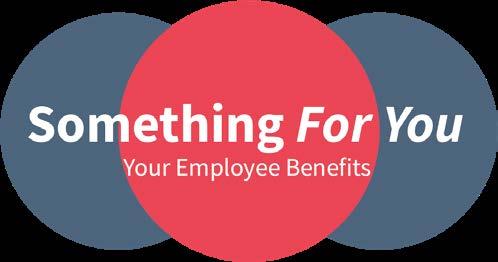

Noel Leeming - Friends and Family Offer, from 7–20 November 2022
From 7 November to 20 November you, your friends and family, can get amazing discounts (up to 20 percent) on a huge range of products from Noel Leeming. See the flyer for more information: Noel Leeming Flyer
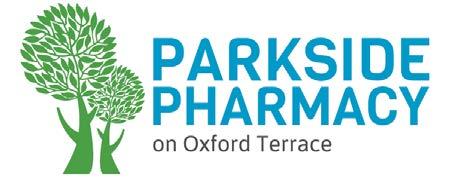
We are opening a gift shop at Parkside Pharmacy on Oxford Tce on Monday 7 November 2022. We will be offering an exciting and interesting range of gifts, just in time for Christmas! All Te Whatu Ora Waitaha staff will receive a 10 percent discount off the retail price of all products (excluding prescriptions, pharmacist-only medicines and items on special).
Christchurch Electric Bicycles - 2-4 Beckford Road, St Martins, Christchurch 8022
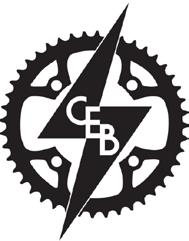
Christchurch Electric Bikes would like to offer staff discounts on various bikes and also 12 months free servicing for most bikes sold or ordered before Christmas- show your staff ID to redeem, see more information here
The team won every game they played during the season
False (Alan Shearer holds the record)
a. He leapt into the crowd and kicked an opposition fan
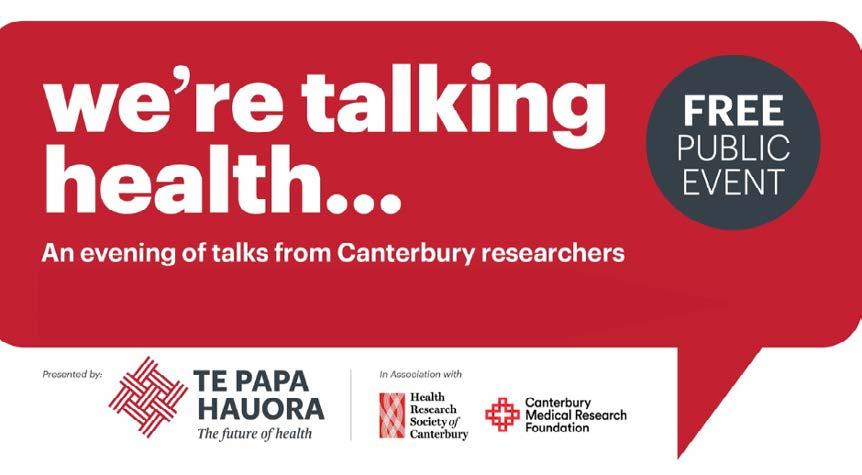
This year's 2022 'We're talking health' research talks once again showcased health researchers from Canterbury and their work. Our theme this year was "your health, the health of your whānau" with a range of interesting talks across many areas of our communities. It was exciting and inspiring to learn about the mahi in Canterbury being done to make healthier communities around us. If you missed it- watch the presentations here or select the individual talk below! Read on our website the full recap.
The rapid rise of rapid delivery – unhealthy products from your phone to your door
Dr Rose Crossin: Lecturer, Department of Population Health, University of Otago, Christchurch. Click here
Why I can’t be bothered? How translational neuroscience can help us understand loss of motivation in brain disorders
Dr Campbell Le Heron: Senior Lecturer Department of Medicine, University of Otago Christchurch, Consultant Neurologist, Department of Neurology, Te Whatu Ora Waitaha, New Zealand Brain Research Institute, Christchurch. Click here.
Your time matters - reducing time spent in the Emergency Department (ED)
Dr Laura Hamill: Research Fellow, Emergency Department, Te Whatu Ora Waitaha. Click here
Should exercise be included as part of the cancer treatment process?
Jessica Allan: Postgraduate student, School of Health Sciences University of Canterbury. Click here
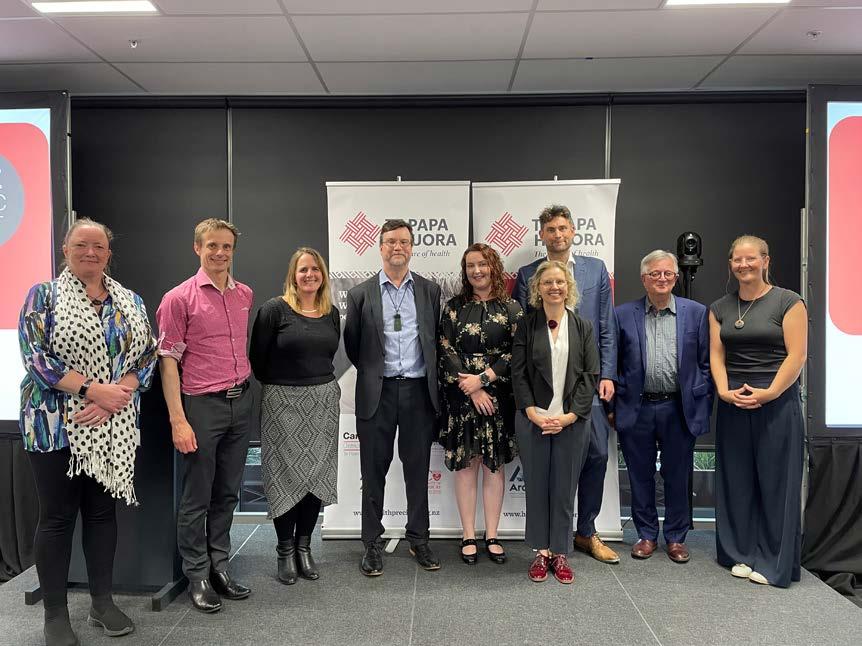
Dr Martin de Bock: Senior Lecturer, Department of Paediatrics, University of Otago, Christchurch, Paediatric Endocrinologist, Te Whatu Ora Waitaha. Click here
Dr Sarah Harris: Senior Lecturer, Department of Paediatrics, University of Otago, Christchurch, Paediatrician, Te Whatu Ora Waitaha. Click here.

We’re talking health speakers, from left, Event Chair Tracy Kirkbride, Senior Lecturer, Department of Paediatrics Martin de Bock, Lecturer, Department of Population Health Rose Crossin, Professor Joe Boden, Research Fellow, Emergency Department Laura Hamill, Senior Lecturer, Department of Paediatrics Sarah Harris, Senior Lecturer Department of Medicine Campbell Le Heron, Professor, School of Psychology, Speech and Hearing John Dalrymple-Alford, and student Jessica Allan
Professor Joe Boden: Professor, Department of Psychological Medicine, University of Otago, Christchurch. Click here.
Professor John Dalrymple-Alford: Professor, School of Psychology, Speech and Hearing, University of Canterbury, New Zealand Brain Research Institute, Christchurch. Click here.
Heart health begins in the womb – the importance of healthy beginnings
Antimicrobial stewardship: It's time for collective action, Tuesday 22 November, 7-8pm
Presented by Dr Sharon Gardiner and Dr Matire Harwood, this webinar will provide a high-level review of New Zealand’s collective responsibility around slowing antimicrobial resistance and where primary care fits in.
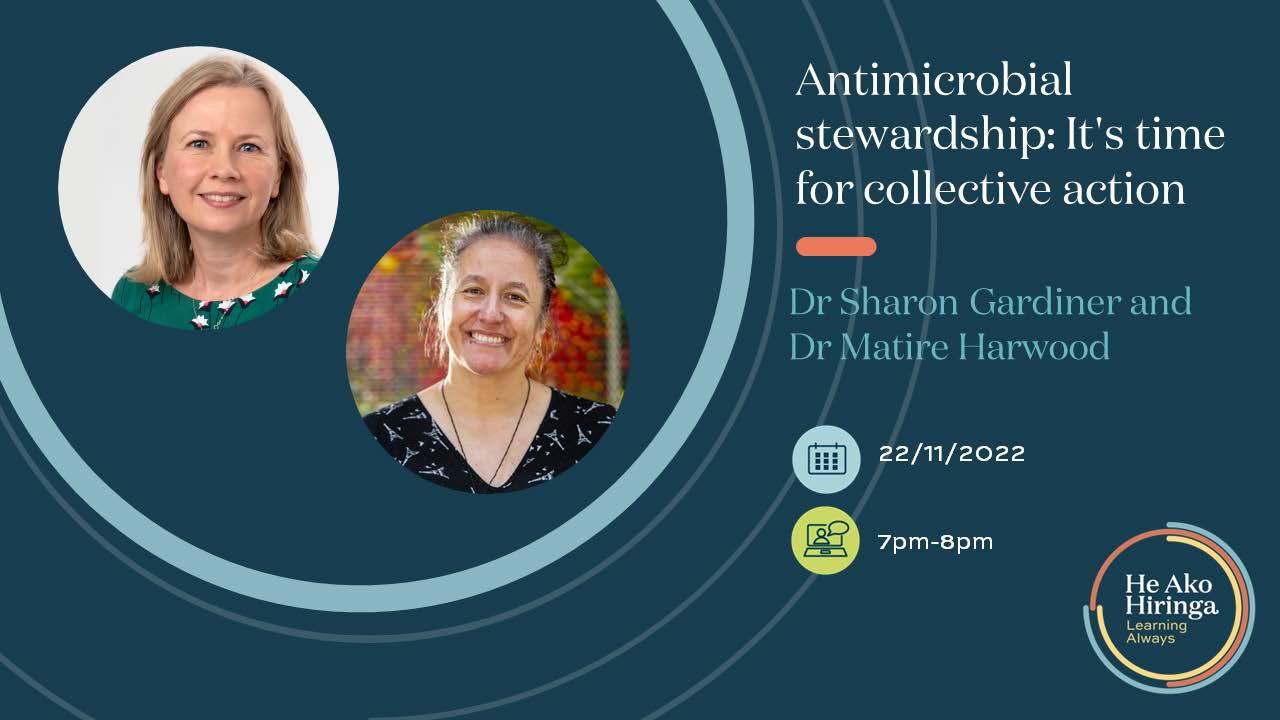

Dr Gardiner and Dr Harwood were on the expert panel that assisted in the writing of the Kotahitanga: Uniting Aotearoa against infectious disease and antimicrobial resistance report (Office of the Prime Minister’s Chief Science Advisor).
Timed to coincide with World Antimicrobial Awareness Week (18-24 November), this webinar is suitable for all health professionals and is free to attend.



